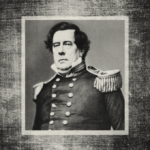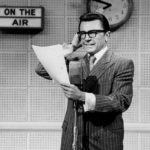
A “B” In Your Sonnet
Recently, Kay Day at Indie Art South offered a quick analysis of our new songs, “I’m Not Going Back To Jacksonville” and “Beneath A Solemn Sky,” at one point comparing the closing line of the latter (“with a sad lament to the penitent, who are damn well sanctified”) to the turn of a sonnet. It’s a very flattering observation. (Thanks, Kay!) That line does represent a kind of ironic resolution to the song’s questions about the nature of redemption. However, despite the slight structural similarity to a sonnet, that song does not follow the strict rhyme scheme of the classical form. If an English Professor graded the lyrics by the standards of classic poetry, they would get, at best, a B-. Alas, it appears we’re not yet ready to go toe to toe with Milton, Wordsworth or Shakespeare on their own turf. But it does raise the old question about the importance of rhyme in poetry and song.

Right Place, Wrong Rhyme
Actor, prodigious songwriter and comedian Steve Allen once said:
“Roses are red
Violets are blue
Some poems rhyme
But this one doesn’t”
Steve was tickling the funny bone using the element of surprise. We attempted the same technique long ago in a demo for a really dumb song called “Wrong Emphasis” (pronounced “wrong em-PHA-sis”) that contained the immortal line, “But now I haven’t got much time, because I can’t find words that sound alike.” Yikes! But leaving aside the dubious practice of purposefully blowing obvious rhymes for cheap laughs, a proper rhyme can be an elusive quarry.
And Steve Allen’s silly poem does illustrate the larger rhyme/no-rhyme point. Most popular poetry rhymed up until the late 19th century, at which time poets such as Walt Whitman (the American “father of free verse”), Gustave Kahn (French inventor of “vers libre”), and much later Allen Ginsberg (Beatnik seeker of a “new vision”) completely dispensed with rhyme and other traditional conventions of their craft. (By the way, don’t confuse the French Symbolist Gustave Kahn with the great Tin Pan Alley lyricist Gustav “Gus” Kahn, who wrote “Dream A Little Dream Of Me” and other well-known hits.) Of course, every new style has its detractors. The poet Robert Frost, with whom we’ve previously taken poetic license (see here), was no fan of this movement that ignored the very rules of structure that defined the classical form. To him, non-rhyming poetry was just too easy. “Writing free verse is like playing tennis with the net down,” he quipped. From Frost’s perspective, unlike a trapeze artist, writing poetry without a net is LESS exciting. In fact, the added difficulty of having to find rhymes can spur creativity, as Oxford Professor Of Poetry James Fenton pointed out in his description of rhyming couplets: “Generally speaking, rhyme is the maker for the end of a line. The first rhyme-word is like a challenge thrown down, which the poem itself has to respond to.” That’s why people avoid first lines like, “The morning sky was bright and orange.” You don’t want to paint yourself into a corner. Still, French literary giant Victor Hugo considered the technique indispensable when he defined it as, “Rhyme, that enslaved queen, that supreme charm of our poetry, that creator of our meter.”
His effusive praise might be over-egging the pudding just a bit. But rhyme schemes do bring something valuable to the table. For instance, rhymes naturally suggest rhythmic sound patterns, connectivity, and resolution in both songs and poems. But even though renowned poets have inspired popular songs, the two forms are certainly not interchangeable. A poem is not just a song without music, although a poem may use background music as a mood-setting accompaniment. Conversely, songs are normally more than just a poem with a musical appendage attached as an afterthought.
In songs, the lyric and music must organically intertwine to support and compliment each other. The cadence, phrasing and syllables of words must simultaneously get the intellectual ideas across, sit comfortably atop the notes of a distinct melody within a chordal progression, and fit within the rhythmic pattern of a piece that works together lyrically and musically. The fact that songs almost always rhyme is a blessing and a curse. The words that may best express the thought, mood or feeling of a composition often do not rhyme, or are the wrong number of syllables, or the stress might fall in the wrong place. The quest for the right turn of phrase that meets all those prerequisites can be absolutely maddening, but it’s very gratifying to finally find that puzzle piece that works. As Roseann Cash put it:
“There’s nothing that gives me more thrill than when I’m writing and a couplet works. I find the right rhyme, or it’s just perfect. There’s nothing that exciting.”
Her joy at finding the perfect rhyme speaks to the frustrated poet/songwriter in all of us. And yet, other recognized masters of songcraft have downplayed rhyme’s overall importance. Mozart himself declared, “Versification is, indeed, indispensable for music, but rhyme, solely for rhyming’s sake, most pernicious.” Echoing his sentiment, famous librettist Dorothy Fields (who penned “The Way You Look Tonight” and other standards) simply said, “A rhyme doesn’t make a song.”
That’s undoubtedly true. The challenge isn’t just in finding similar sounds that convey an approximate meaning, but in avoiding obvious choices, moon-spoon-June cliches, and forced rhymes. The great Sammy Cahn said, “Take a simple name like Nicholas: you can rhyme it with ridiculous. If you aren’t too meticulous. You know, every word’s rhymable.” Perhaps, but the premise that every word CAN be rhymed doesn’t necessarily imply that every word SHOULD be rhymed.
Peak Sublime, Or Weak Rhyme?
Forced rhyme can push the thin boundary between clever and awkward. For example, here’s a few lines from Steve Miller’s 1976 hit, “Take The Money And Run”:
“Billy Mack is a detective down in Texas
You know he knows exactly what that facts is
He ain’t gonna let those two escape justice
He makes his living off other people’s taxes”
So, did Miller cross the line there? Here at GBD we love the sheer, unabashed boldness he displayed by singing that quatrain of phonic and grammatical imperfection with a straight face. But beauty is in the ear of the beholder. Let’s look at another example a little closer to home. The first verse of our blues-rock novelty song “Standup Guy” unabashedly pairs “meet ya,” “treat ya,” “creature,” and “teach ya.” Those ridiculous rhymes actually obliterate the boundary between clever and awkward. But don’t hold it against us, we beseech ya. It just goes to show that rhyme doesn’t pay. However, in our own defense, the song is intended to be very tongue in cheek. So the dumb rhymes aren’t a bug, they’re a “feature.” (Sorry.)

Too Clever By Gaffe
At the other end of the spectrum from forced rhymes are sophisticated, unexpected rhymes that come out of left field. Librettist W.S. Gilbert, of Gilbert and Sullivan fame, offers a prime example with the rapid-fire patter of “I Am the Very Model of a Modern Major General” from Pirates of Penzance. The melody was actually used by mathematician/musical satirist Tom Lehrer for his chemistry-geek tongue-twister, “The Elements.” (By the way, Gilbert and Sullivan, those optimum poobahs of opulent operettas, are not to be confused with Gilbert O’Sullivan, who also cranked out some whimsical rhymes, even in a song titled “Nothing Rhymed.”) But allow us a moment to gaze into our own navel once again to give an example about too much of a good thing. In our song “Britanny,” we attempted to emulate two lyrical masters with some layered rhymes in the bridge, striving to create an odd hybrid of Elvis Costello’s acerbic phrases and Cole Porter’s penchant for internal rhyme. To wit, “One HAS to grant comPASSION to a BATTERED soul IN NEED, AS you can iMAGINE, she FLATTERED me INDEED.” Yes, it’s a bit much. There’s risk in ladeling such contrived cleverness on too thickly in too short a space. But we’re not alone. “Brittany” faces the same rhyming challenges as the hundreds of other Costello-Porter pastiches that inundate the airwaves.

Between Rock And A Bard Place
The great debate on rhyming is really quite involved; the words creat a twist of fate not easily resolved. See what we did there? And to prove our point, let’s end the discussion with conflicting views from two more timeless masters of song and verse.
“I love poetry. I love rhyming. Do you know, there are poets who don’t rhyme? Shakespeare did not rhyme most of the time, and that’s why I do not like him.”
Chuck Berry
“Was there ever any man thus beaten out of season,
When in the why and the wherefore is neither rhyme nor reason?”
William Shakespeare
But enough of this bickering! Now that we’ve swung full circle back to the bard himself, has our rambling discourse settled anything? Not really. There are famous poems that rhyme, like Coleridge’s “Kubla Khan,” and classic poems that don’t, such as the Olde English Anglo-Saxon epic “Beowulf.” And there are fun songs filled with rhyme, like “Life Is A Rock (But The Radio Rolled Me)” by Reunion, and exquisite songs that don’t, such as the haiku-infused ballad “Moonlight In Vermont.” As they say, “To each his own.” And that also happens to be the title of a very fine song, so we’ll close this “rhyme or no rhyme” discussion with one of its couplets:
“What good is a song
If the words just don’t belong.”


